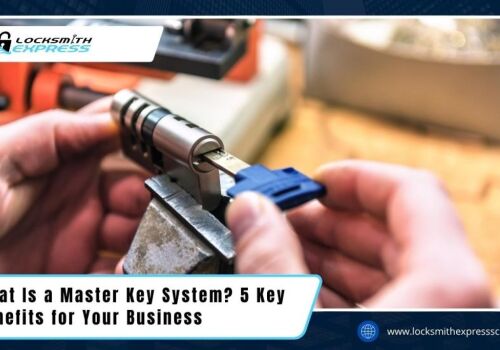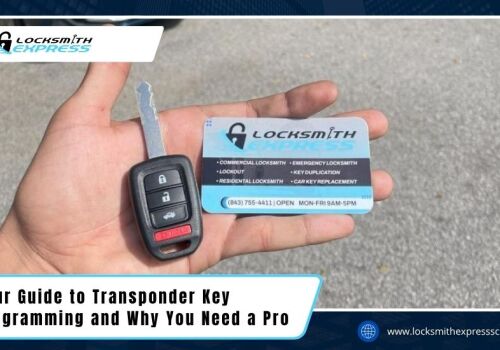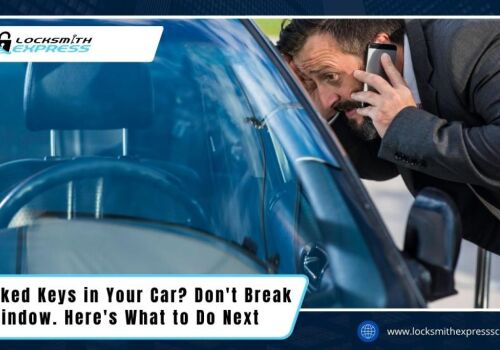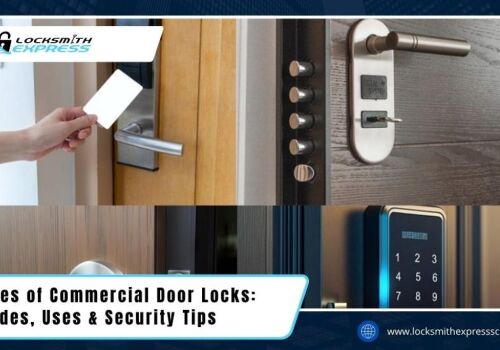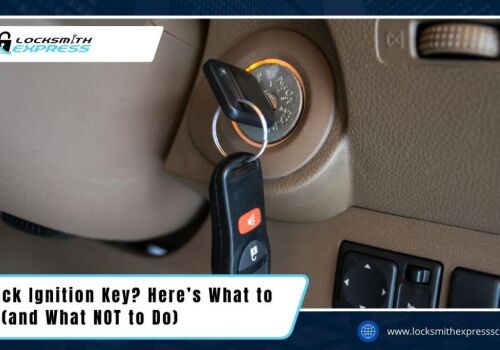Choosing the right lock is important for keeping your home or business safe. There are many types of locks available, each offering different levels of security and convenience. In this guide, we'll look at the most common types of door locks used in residential and commercial settings. Whether you're upgrading your home security or protecting a business, this post will help you make a smart and informed decision.
- Common Types of Locks and Their Uses
- Deadbolt Locks
- Knob Locks
- Lever Handle Locks
- Padlocks
- Smart Locks
- Mortise Locks
- Keyless Entry Locks: No More Lost Keys
- Which Lock Is Right for You?
- Need Help Choosing the Right Lock?
- Frequently Asked Questions
- What is a high-security lock?
- Can locks be rekeyed instead of replaced?
- What is lock bumping, and how do you prevent it?
- Are smart locks safe for home use?
- How do master key systems work?
Common Types of Locks and Their Uses
There are many kinds of locks available, each designed for different uses and levels of security. Below are the most common types you'll find in homes and businesses. Understanding how they work can help you choose the right one for each door or entry point.
Deadbolt Locks
Deadbolt locks are a popular choice for front and back doors. They are known for their strength and resistance to forced entry. A deadbolt has a solid metal bolt that slides into the door frame when locked. Unlike spring bolt locks, it cannot be moved without turning the lock cylinder. There are several types of deadbolt locks:
- Single Cylinder Deadbolt: This is the most common type. It uses a key on the outside and a thumb turn on the inside.
- Double Cylinder Deadbolt: Requires a key on both sides, adding extra security, but can be risky in emergencies.
- Keyless Deadbolt: Operated with a keypad or smart lock system, offering convenience without a key.
Deadbolts are best for exterior doors where extra strength is needed. If you're looking for better home protection, a deadbolt is a smart and reliable option.
Knob Locks
Knob locks are commonly used on interior doors, such as bedrooms and bathrooms. The locking mechanism is built into the knob itself, which makes them easy to use but less secure than other locks when used on exterior doors. For that reason, knob locks should never be the only line of defense for entry points like front or back doors. Here's when knob locks make the most sense:
- Interior Doors in Homes: Bedrooms, bathrooms, or closets where privacy is needed but high security is not.
- Office Spaces or Restrooms: In commercial settings, they offer light security for non-sensitive areas.
- Temporary Privacy: When paired with stronger locks, knob locks can provide convenience without compromising safety.
While they're simple to install and operate, remember that knob locks are easy to force open. For better protection, they should be used alongside deadbolts or more secure locking systems.
Lever Handle Locks
Lever handle locks are similar to knob locks but have a handle instead of a knob. These are easier to operate, especially for people with disabilities or arthritis, making them a good choice for places that need to meet accessibility standards. These locks are commonly used in:
- Commercial Buildings
- Office Doors
- Public Restrooms
They offer moderate security and are best used for interior doors. Lever handle locks can come with push-button or key-based locking features. Their ease of use makes them a popular choice, especially in businesses and medical offices.
Padlocks
Padlocks are one of the most recognizable types of locks. They are not attached to a door permanently and can be used on gates, sheds, lockers, and storage units. Padlocks are easy to use and come in many sizes and strengths. There are two main kinds:
- Combination Padlocks: Opened with a rotating dial or number code.
- Keyed Padlocks: Require a physical key to unlock.
Some high-security padlocks have features that resist cutting and picking. However, since padlocks can be removed, they are better for temporary or outdoor use rather than front doors or business entrances.
Smart Locks
Smart locks are a newer type of lock that uses digital technology instead of traditional keys. They can be controlled using a smartphone, key fob, or even voice commands. Smart locks are becoming more popular in both homes and businesses. Features may include:
- Keyless entry using codes or apps
- Remote access and monitoring
- Auto-locking after a certain time
- Temporary codes for guests or workers
While smart locks offer convenience, it's important to choose one with strong encryption and battery backup. These locks are ideal for people who often forget keys or want to track who enters and leaves their home or office.
Mortise Locks
Mortise locks are often used in commercial buildings, apartments, and older homes. These locks fit into a pocket (or "mortise") in the door, making them stronger than surface-mounted locks. They usually include:
- A latch and deadbolt combined in one unit
- A lever or knob to operate the latch
- High-quality construction for long-term use
Because of their strength and durability, mortise locks are common in hotels, office buildings, and multi-family homes. They require professional installation, but they offer excellent protection.
Keyless Entry Locks: No More Lost Keys
Keyless entry locks let you unlock doors with a code, fingerprint, or keycard. Some systems use a mobile app. These locks are great for families, rental homes, and offices. Advantages include:
- No need for keys
- Access codes for different people
- Easy to change codes without changing the lock
Some models even offer audit trails to show when someone entered. This feature is useful in workplaces or vacation rentals. If you want convenience and control, keyless entry may be a good option.
Which Lock Is Right for You?
Choosing the right lock depends on your specific needs, the type of property you're securing, and how the space is used daily. Some locks offer high security for exterior doors, while others are better suited for interior privacy or easy access. By understanding where each lock works best, you can make a smart decision that keeps your home or business safe. Here are some simple recommendations based on common use cases:
- For Front Doors: Deadbolt Locks or Smart Locks
- For Interior Doors: Knob Locks or Lever Handle Locks
- For Businesses: Mortise Locks or Lever Handle Locks
- For Sheds or Gates: Keyed Padlocks or Combination Padlocks
- For Tech-Friendly Homes: Keyless Entry Locks or Smart Locks
If you're not sure what fits your needs, a locksmith can usually tell you what type of lock works best for the situation.
Need Help Choosing the Right Lock?
Choosing from the many types of door locks can feel overwhelming. Each lock has a purpose, and the right one depends on where and how you use it. From basic padlocks to advanced smart locks, understanding your options helps protect your property and loved ones. At Locksmith Express in North Charleston, SC, we specialize in residential and commercial locks. Whether you need new locks installed, upgraded security, or fast lockout service, we're just a call away. Contact us to speak with a friendly expert today!
Frequently Asked Questions
What is a high-security lock?
A high-security lock is built with advanced materials and mechanisms that resist picking, drilling, and bumping. These locks often include reinforced cylinders and patented keyways for added protection.
Can locks be rekeyed instead of replaced?
Yes, many locks can be rekeyed to work with a new key. This is done by adjusting the internal pins of the lock so that old keys no longer function, offering security without changing the hardware.
What is lock bumping, and how do you prevent it?
Lock bumping is a method of opening pin tumbler locks using a specially cut key. To prevent it, use bump-resistant locks or high-security cylinders that block this type of forced entry.
Are smart locks safe for home use?
Smart locks are safe when equipped with encryption, strong passwords, and two-factor authentication. They offer convenience and access control, but regular updates and secure networks are important.
How do master key systems work?
A master key system allows multiple locks to be opened by one key while still allowing each lock to have its own key. It's commonly used in apartments, offices, and commercial buildings.





